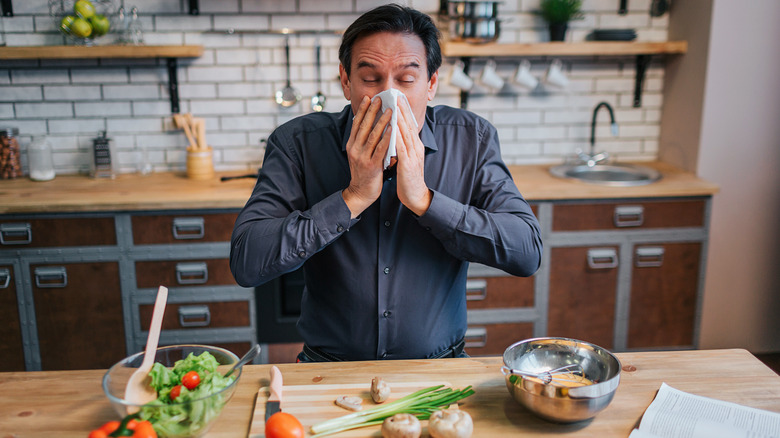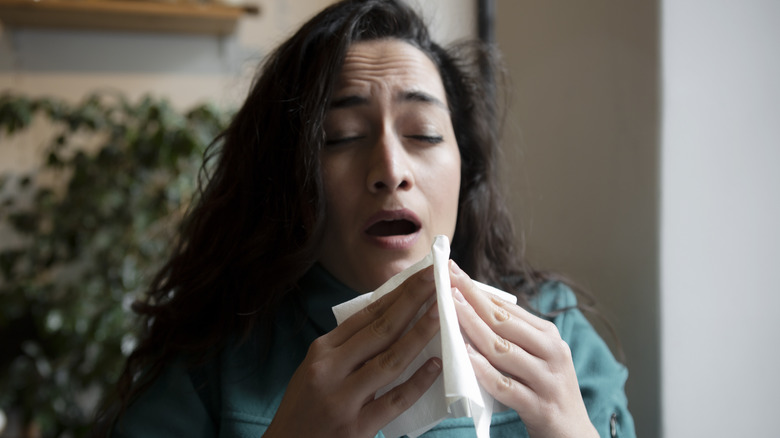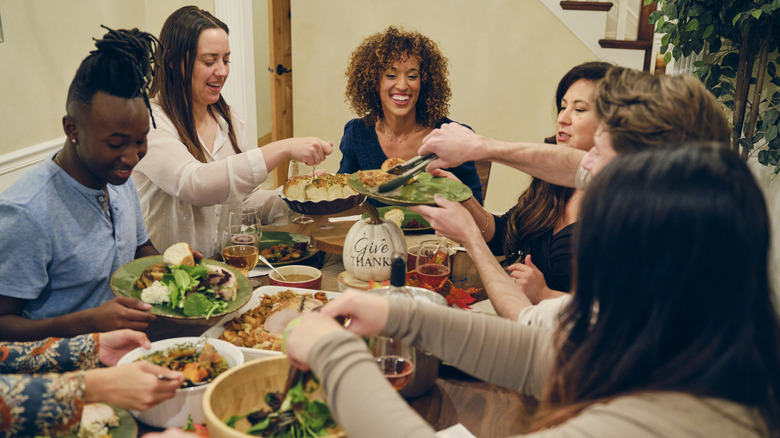What It Means When You Sneeze After Eating A Big Meal
There's nothing better than leaning back in your chair at the kitchen table feeling wholly satisfied after a hearty meal. If you're feeling particularly full, you might expect a little bloating or sleepiness to come over you soon afterward. What you might not expect, however, is to suddenly be hit with a frenzied sneezing fit.
If you're someone who finds themselves sneezing after eating, it might mean that you've ingested something particularly spicy. Known as "gustatory rhinitis," this kind of aggravation of the inner lining of the nose has been linked with the consumption of foods such as hot peppers, wasabi, horseradish, and more, according to experts at UCLA Health. Some individuals may alternatively experience this bodily reaction in response to ingesting physically hot foods, like soup. People tend to be more susceptible to gustatory rhinitis, sometimes informally referred to as "sneezures," as they grow older.
While the inner workings of gustatory rhinitis aren't entirely clear, some people experience chronic sneezing after a big meal independent of what kind of food they eat. This is known as a rare health condition aptly termed "snatiation," reports the Gaston Gazette.
What is the snatiation reflex?
According to a 2009 review published in Therapeutic Advances in Respiratory Disease, "snatiation" — a blending of the words "sneeze" and "satiation" — is defined as an uncontrollable sneezing fit that occurs as a result of stomach expansion from overeating.
The condition was first identified in the scientific literature in 1989 with a study that outlined the case of a man in his early 30s who routinely experienced an average of three to four sneezes after eating to the point of no longer being able to ingest any more food. There is thought to be a genetic component to snatiation, as evidenced in the case study where it was noted that the man's siblings, father, uncle, as well as other family members also exhibited the same symptoms. He first became interested in the condition when his daughter started experiencing the phenomenon around age 1. In some instances, the family experienced as many as 15 sneezes back to back following a big meal.
Can sneezing after a big meal be cured?
For some people, snatiation can be disruptive in day-to-day life. Eating-focused holidays like Thanksgiving can prove particularly challenging for those with the condition, such as in the case of the Kitterman family, where one family member reported experiencing upwards of 13 shuddering sneezes after a large meal (per The Wall Street Journal).
Although the research surrounding snatiation is limited, some experts believe it may be a byproduct of miscommunication between the body's parasympathetic nervous system (which is responsible for our involuntary reactions) and the brain.
While no cure for the condition has been identified, some individuals have found ways to manage their post-meal sneezing episodes. This includes eating more slowly; prioritizing carbohydrates over meat; and allowing for ample time between meals, such as when transitioning from dinner to dessert.
Currently, researchers can't say for sure how many people are affected by snatiation, as individuals often feel uncomfortable discussing symptoms with their healthcare provider.



